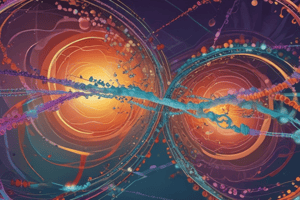Podcast
Questions and Answers
What is the function of the lacZ gene in the lac operon?
What is the function of the lacZ gene in the lac operon?
Which component serves as a binding site for RNA polymerase in the lac operon?
Which component serves as a binding site for RNA polymerase in the lac operon?
Under what condition is the lac operon typically induced?
Under what condition is the lac operon typically induced?
What happens to cAMP levels when E. coli is starved for carbon sources?
What happens to cAMP levels when E. coli is starved for carbon sources?
Signup and view all the answers
Which of the following correctly describes the structural components of the lac operon?
Which of the following correctly describes the structural components of the lac operon?
Signup and view all the answers
What is the primary purpose of regulating gene expression in organisms?
What is the primary purpose of regulating gene expression in organisms?
Signup and view all the answers
Which of the following best describes a repressible operon?
Which of the following best describes a repressible operon?
Signup and view all the answers
What is a characteristic of positive regulation in gene expression?
What is a characteristic of positive regulation in gene expression?
Signup and view all the answers
What is the function of riboswitches in prokaryotic gene regulation?
What is the function of riboswitches in prokaryotic gene regulation?
Signup and view all the answers
What defines a transcriptome?
What defines a transcriptome?
Signup and view all the answers
Which of the following techniques is used to study gene expression levels?
Which of the following techniques is used to study gene expression levels?
Signup and view all the answers
What is the role of an inducer in gene expression?
What is the role of an inducer in gene expression?
Signup and view all the answers
How does negative regulation affect gene expression?
How does negative regulation affect gene expression?
Signup and view all the answers
Study Notes
Gene Expression
- Gene expression is the process of using the information from a gene to create a functional product.
- This product is usually a protein.
- Non-protein coding genes like rRNA, tRNA, or snRNA create functional RNA.
- Eukaryotes and prokaryotes use this process.
Importance of Regulation of Gene Expression
- Adapting to environmental challenges requires altering gene expression.
- Tissue-specific gene expression results from transcription control.
- Hormones, heavy metals, and chemicals influence gene regulation.
- Disease can result from the dysregulation of gene expression.
- Positive and negative regulation are important.
- A positive regulator (enhancer or activator) mediates positive regulation.
- Inhibition of a negative regulator also results in positive regulation.
- A negative regulator (silencer or repressor) mediates negative regulation.
- An inducible gene's expression increases in response to an inducer or activator and has a low basal rate of transcription.
- Genes with a high basal rate are downregulated by repressors and called repressible genes.
Lac Operon
- An operon is a cluster of structural genes that are expressed together, along with their promoter and operator.
- The lac operon (lactose operon) is required for the transport and metabolism of lactose in Escherichia coli and other enteric bacteria.
- It has three structural genes: lacZ, lacY, and lacA.
Lac Operon Genes and Functions
- lacI - gene for the repressor protein
- P - promoter
- O – operator
- lacZ - gene for β-galactosidase
- lacY - gene for β-galactoside permease
- lacA - gene for β-galactoside transacetylase
Example of Positive Control of Gene Expression (cAMP control of the lac operon)
- The lac operon enzymes are induced by the presence of lactose or isopropyl thiogalactoside (IPTG), a lactose analog.
- When a bacterium is starved of a carbon source, it accumulates cAMP.
- Glucose is the preferred carbohydrate source for E. coli.
- When glucose is absent, the lac operon is turned on so the bacterium can metabolize alternative carbohydrates like lactose.
- The lac operon promoter has two binding sites.
- One site is where RNA polymerase binds.
- The second is the binding site for the catabolite activator protein (CAP) and cyclic AMP (cAMP) complex.
- This complex induces the lac operon enzymes.
Studying That Suits You
Use AI to generate personalized quizzes and flashcards to suit your learning preferences.
Related Documents
Description
Explore the vital process of gene expression and its regulation in both eukaryotes and prokaryotes. This quiz delves into the mechanisms that control gene activity, including the effects of environmental factors and the significance of positive and negative regulatory elements. Test your understanding of how these processes impact health and disease.




